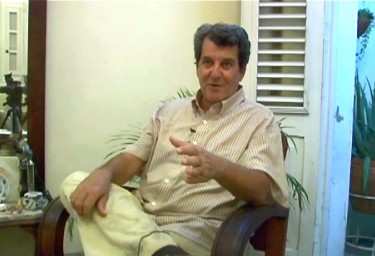On July 23, 2012 Cuban pro-democracy advocate Oswaldo Payá was killed in a car accident in the eastern city of Bayamo.
Leader of the famed Varela Project and a winner of the European Parliament's Sakharov Prize for human rights and democracy, Oswaldo Payá was internationally recognized as one of Cuba's most pragmatic, forward-thinking advocates for freedom of expression, freedom of association, and other fundamental rights on the island. His colleague, Harold Cepero, was also killed in the accident.

Oswaldo Paya, at his home. Screenshot from video by Tracey Eaton, taken with photographer's permission.
Survivors included Angel Carromero and Jens Aron Modig, European politicians from Spain and Sweden, who were supporters of Payá's efforts. Both currently remain hospitalized, but are reportedly in stable condition. As of yet, no account of the accident from either survivor has appeared in mainstream or citizen media.
The public first learned of the advocate's death through reports from acclaimed Cuban blogger Yoani Sánchez, who was close with Payá's family. Sanchez tweeted to her followers that she received a call from Ofelia, Payá's wife, informing her of the accident:
@yoanisanchez: #Cuba Acabo de hablar con Ofelia Acevedo esposa de @OswaldoPaya y me confirma que su esposo sufrio un accidente Los mantengo informados!
Hours later, Sánchez tweeted to her 270K followers that Paya had died:
@yoanisanchez: #Cuba Confirma Carlos Amador secretario del Obispo de #Bayamo el fallecimiento de @OswaldoPaya @el_pais @CNNEE
In Cuba's main national newspaper, Granma, a short article described the accident and named Payá as one of the victims, but did not refer to his political work.
Respected by many, but criticized both by government supporters and hard-line anti-Castro groups, Payá founded Cuba's Christian Liberation Movement, a non-denominational political organization working to advance human rights and civil liberties in Cuba. A decade later, in 1998, he spearheaded the Varela Project [es], which to date remains one of the most pragmatic and measured attempts by a Cuban civil society group to advocate for change within the Cuba's political system. Payá and other members of the project collected 11,000 signatures on a petition calling for a referendum on the country's constitution. The referendum, which was not accepted by the Cuban government, would have enshrined rights to free expression, free association, full electoral participation, and other fundamental liberties for all Cubans.
Payá was also known for his commitment to non-violent action, his moderate approach to advocacy, and his refusal to accept support funds from outside governments, most notably the US. In a 2011 interview with journalist Tracey Eaton, he commented on these convictions:
El dinero de los Estados Unidos no va a decidir el cambio en Cuba. […] La esencia del problema es que el gobierno cubano no reconoce los derechos de los ciudadanos cubanos en Cuba. […] El problema está en Cuba, y la solución está en Cuba, y entre cubanos.
Tracey Eaton interview with Oswaldo Paya, from cubamoneyproject.org:
Payá's death became a global trending topic on Twitter shortly after Sanchez confirmed his death. Marta López García [@aircag] tweeted:
@aircag: #CUBA Oswaldo Paya jamas insulto a sus contrincantes.La lección que deja,la ética por encima de las diferencias.Descanse en libertad !!
Soon after the reports surfaced, Payá's daughter, Rosa María, told foreign press outlets that she feared the crash was not an accident. While state media reported that the driver lost control of the vehicle and that the car crashed into a tree, other reports have held that the car crashed with another vehicle, possibly a truck.
Many voices on Twitter commented on this allegation:
@ZapataVive tweeted:
#CUBA OSWALDO PAYA Y SU ASISTENTE HAROLD CEPERO MUERTOS POR SER OPOSITORES DE #CASTRO QUE EN PAZ DESCANSEN !!
Blogger and photographer Orlando Luis Pardo Lazo [@OLPL] tweeted:
Hay algun culpable? Habra juicio? O se dio a la fuga? Se busca? O fue un fallo tecnico? O acaso un acierto tecnico…?
Pardo Lazo live tweeted memorial services on the afternoon of July 23rd and included a brief video in which mourners can be seen applauding Payá. Details of the accident will be reported on Global Voices when they are known. For now, those who admired Payá continue to express their grief over his death, and admiration for his work.
Arturo Lopez Levy, a Cuban-born doctoral candidate in Philosophy at the University of Denver, wrote a detailed essay on Payá's political organization and pragmatism. Lopez Levy commented on the leader's uniquely moderate position among pro-democracy advocates in Cuba:
Payá deja un camino apenas empezado: trabajar desde el orden constitucional post-revolucionario para canalizar la vibrante pluralización social de la isla en una alternativa racional y nacionalista, de democracia y estado de bienestar, al proyecto de reformas parciales de Raúl Castro. Quizás en Washington y Miami se iniciará una reflexión sobre el costo de continuar una política maximalista, contraproducente a la consolidación de un proyecto de oposición moderada.
Blogger Dimas Castellanos [es] wrote:
Payá, con independencia de cualquier diferencia con su proyecto o forma personal de dirigir, por su labor durante más de dos décadas, por su persistencia, por permanecer en Cuba y por otros muchos por, ocupa un un lugar en la historia de Cuba. El mejor homenaje es darle continuidad a su obra, es decir, a la lucha por la democratización de nuestro país.







18 comments
Thanks for the post!
Looking forward to find out more about this car accident.